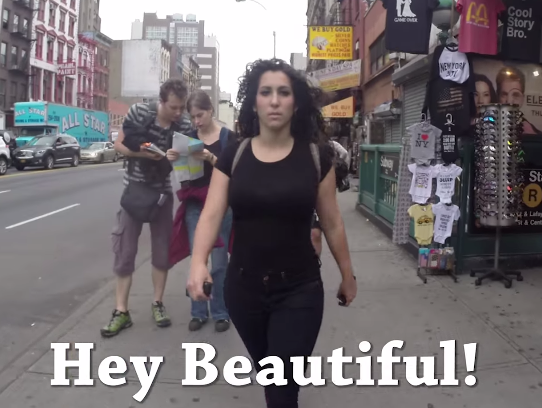The Lilith Blog 1 of 2
January 29, 2015 by Eleanor J. Bader
How Safe Does She Feel Walking Down the Street?
 When 24-year-old aspiring actor Shoshana Roberts saw an ad soliciting “Female Talent for Anti Street Harassment Viral Video” on Craigslist, she immediately knew that she wanted to apply.
When 24-year-old aspiring actor Shoshana Roberts saw an ad soliciting “Female Talent for Anti Street Harassment Viral Video” on Craigslist, she immediately knew that she wanted to apply.
The date was September 12, 2014.
A brief telephone interview with Chicago filmmaker Rob Bliss of Rob Bliss Creative took place a day later, and by the end of October Bliss had captured 10 hours of footage showing Roberts walking through the five boroughs of New York City while being catcalled by dozens of men. He later edited this into a two-minute video that has now been seen by approximately 39 million people in every corner of the world.
The video was a collaboration between Bliss and Hollaback, an international, feminist, anti-street-harassment organization which, since its founding in 2011, has trained activists in 26 countries and more than 80 U.S. cities to oppose anti-woman violence and misogyny. Although Roberts wasn’t familiar with Hollaback when she answered the ad, the issues the group works on resonate deeply for her.
That’s because since middle school she has been periodically groped, hooted at, and sexually harassed by strangers, colleagues and so-called friends. “The first time was when I was 12, right before my Bat Mitzvah,” she begins. “I was asleep at my friend’s house when her older brother came in and snipped my pajama bottoms off with a scissors and then started to assault me.” Roberts’ voice rises and her hands fly as she recounts the indignity, as if she wants to make sure that I am listening closely to what she has to say. “At first I was really confused and wasn’t sure if it was real or a nightmare. But I had the cut pajama pants. I hid them in the bottom of my dresser for many years. I didn’t tell anyone what had happened right away, but about a month later I broke down crying at school. I couldn’t keep what had happened quiet anymore. The worst part of it was that my family and his family were friends.”
Several years later, when Roberts was a theatre student at Kutztown University, she was again attacked, this time by a male student who attempted to get on top of her despite clear indications that this was not what she wanted.
Physical hostility, of course, is less frequent than verbal harassment. Indeed, Roberts reports that random men–most of them strangers–have frequently made comments to her, offering everything from a sexual liaison to fashion advice. One of the most vivid incidents, she continues, happened when she was in college. “There is just one main street in Kutztown, Pennsylvania, and I remember one really cold winter day when I was walking around wearing sweats, rain boots, and a puffy down coat. I was the only person on the street and out of nowhere a guy I’d never seen before passed me in his car and screamed out the word ‘Slut.’” Roberts’ incredulity is still audible as she recounts the experience. That said, she notes that the encounter taught her something that she has never forgotten: Sexual harassment has nothing to do with appearance but is instead a violation meant to intimidate and frighten.
Calling out this vile behavior, she continues, is the only way to stop it, which is why Hollaback’s anti-harassment video project–as well as the group’s overall mission–is so meaningful to her.
“During the filming, I was walking with a purpose, so I actually did not hear all of the comments directed at me,” she told Lilith. “When one guy started to follow me, walking alongside me despite my obvious lack of interest in him, filmmaker Rob, who was walking behind me with a hidden camera, suggested we take a break. This was how I got rid of this potential menace.” Still, Roberts emphasizes that nothing she experienced during the filming surprised her–not the critique of her physical appearance, injunctions to smile, or invitations to hook up.
But that’s not to say that there were no surprises. In fact, within hours of the video’s posting in late October, it had not only gone viral–receiving one million views in the first 12 hours–but had elicited a range of reactions, positive to negative. Many praised the effort for turning a needed spotlight on street harassment. Others, however, denounced the footage as racist, since virtually none of the harassers Bliss featured are Caucasian. Still others called it anti-male and anti-neighborly, since many of the men are shown saying nothing more than “Hello” or “Good morning” to Roberts. A small minority dubbed Roberts “a snobby bitch,” and worse.
For her part, Roberts makes clear that she did not get to preview the final cut of the video and had little input into what Bliss opted to include. At the same time, she is resolutely proud of the end result. “It’s been frustrating to get hostile reactions, but most of the emails I’ve received have been supportive,” she says. “I feel that if the video helped even one person to understand the impact of sexual harassment and catcalling, I’m glad to have done it.”
Since the video’s release, Roberts has been interviewed by press in Australia, Canada, France, Germany, and by national and local outlets throughout the United States. She is clearly pleased to have played a part in Hollaback’s vital gender equity work. “I feel passionate about this issue,” she adds. “But at the end of the day all I did was walk the streets in jeans and a tee-shirt.”
 Please wait...
Please wait...